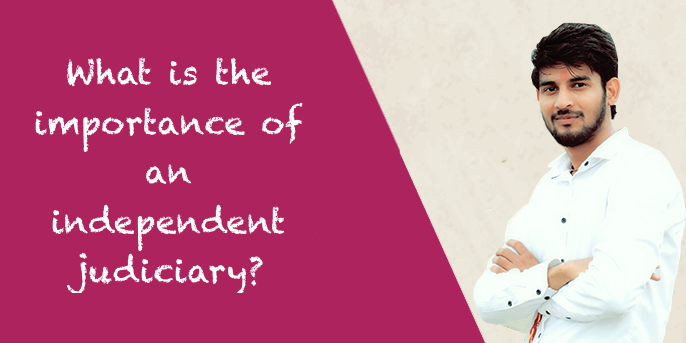What is the importance of an independent judiciary? Does the Indian Constitution provide for an independent judiciary? Refer to the relevant provisions of the Indian Constitution which ensure the independence of judiciary.
Ans. Importance of an Independent Judiciary : One of the basic features of the Federal Constitution is the division of powers between the Central and State Govts. on the one hand and the State has three distinct but co-ordinate units on the other hand. The legislature, which makes the Executive, which executes the law and the judiciary which interprets the law. This division of power is made by a written constitution which is the supreme law of the land. Since the language of the Constitution is not free from ambiguities and its meaning is likely to intepreted differently by different authorities at different times. It is therefore, very natural that in any federation disputes might arise betwee Central and States Govt. regarding their respective powers. Thus, in orde tc maintain the supermacy of the Constitution, there must be an independent and impartial judiciary to decide dispute between the Centre and States or the states interse. This function can only be entrusted to an impartial judiciary who can work without fear and favour. The Supreme Court under our Constitution is the final interpreter and the guardian of the Constitution. That is why, the independence of judiciary is essential in a democractic set-up. Only an impartial and independent judiciary can protect the rights of the individual and provide equal justice without fear or favour. It is therefore, very necessary that the Supreme Court should be allowed to perform its functions in an atmosphere of independence and be free from all kinds of political pressures.
Provisions of Indian Constitution ensuring the independence of Judiciary:
The Constitution has made the following provisions to ensure the independence ofJudiciary viz,-
1. Security of tenure of Judges : According to Art. 124 the judges of the Supreme Court have security of tenure. They cannot be removed from office except by an order of the President and that also only on the ground of proved misbehaviour or incapacity, supported by a resolution adopted by a majority of total membership of each House and also by a majority of not less than 2/3 of the members of the House present and voting. Parliament may, however, regulate the procedure for presentation of the address and for investigation and proof of the misbehaviour or incapacity of a judge. But Parlaiment cannot misuse this power, because the special procedure for their removal must be followed.
2. Salary of Judges fixed, not subject to the vote of Legislature : The salaries and allowances of the judges of the Supreme Court are fixed by the Constitution and charged on the Consolidated Fund of India. They are not subject to vote of Legislature. During the term of their office, their salaries and allowances cannot be altered to the disadvantage except in grave financial emergency.
3. Parliament can extend, but cannot curtail the jurisdiction and power of the Supreme Court : In respect of its jurisdiction, Parliament may change pecuniary limit for appeals to the Supreme. Court in civil cases, enhance the appellate jurisdiction of the Supreme Court confer supplementary power to enable it to work more effectively, confer power to issue directions, order writs including all the prerogative writs for any purpose other than those mentioned in Art 32. The point to be noted in all these provisions is that the Parliament can exceed, but cannot curtail the jurisdiction and powers of the Supreme Court. [Art. 138].
4. No discussion in Legislature on the conduct of the Judges : According to Art. 121 neither in Parliament nor in a State Legislature a discussion can take place with respect to the conduct of a Judge of the Supreme Court in discharge of his duties.
5. Power to punish for its Contempt: The Supreme Court and the High Court have the power to punish any person for its contempt (Art 129 and 215). This power is very essential for maintaining the impartiality and independence of the Judiciary.
6. Separation of judiciary from executive : Art. 50 directs the State to take steps to separate the judiciary from the executive in the public services of the State. It emphasises the need of securing the judiciary from the interference by the executive.
7. Judges of the Supreme Court are appointed by the Executive with the consultation of Legal Experts : The Constitution does not leave the appointment of the Judges of the Supreme Court to the unguided discretion of the Executive. The Executive is required to consult Judges of the Supreme Court and High Courts in the appointment of the Judges of the Supreme Court. [Art. 124 (2)], The independence of the Supreme Court is emphasised by Art. 229 which provides that appointment of officers and servants shall be made by the Chief Justice or such other Judge or officer as he may appoint.
8. Prohibition on Practice after Retirement : Art. 124 prohibit retired Judge of the Supreme Court to appear and plead in any court or before any authority within the territory of India. In view of the provisions of the above Constitutional provisions it can be said that the position of the Supreme Court is very strong and its independence is adequately guaranteed. However, there are certain disturbing trends which are likely to threaten the independence of the judiciary at present viz., —
(i) Although judges are appointed by the Executive with the , consultation of legal experts, it was held in S.P. Gupta Vs. Union of India by the Supreme Court that the word “consultation”, did not mean concurrence and the Executive was not bound by the advice given by the judges. The Government may completely ignore the advice of legal experts.
(il) The power of the President under Art 222 to transfer a judge from one High Court to another may also be used to undermine the independence of the judiciary.
Fortunately, in S.C. Advocate on Record Association Vs. Union of India, 1993 4 S.C.C. 441, the Supreme Court overruled S.P. Gupta’s Case and held that the opinion of the ChiefJustice of Indian must be given the greatest weight in the selection of the Judges of the Supreme Court and High Court and the transfer of the High Court Judges. The selection should be made as a result of a participatory consultative process. Thus, the executive element in the appointment process is reduced to minimum and any political influence is eliminated. No appointment of any judge to the Supreme Court or any High Court can be made unless it is in conformity with the opinion of the Chief Justice of India. The Judges made it clear that the opinion of the ChiefJustice of India has not mere primacy, but is determinative in the matter of transfer of High Court Judges and the Chief Justices. The criterion for the appointment of the ChiefJustice of India shall be seniority.
The ruling of the court would go a long in ensuring the independence and impartiality ofJudiciary in India.
In Union of India Vs. Pratibba Bannerjee, 1995 6 S.C.C. 765, the Supreme Court had held that the judges and officials of the High Court are not government servants. Their is no master and servant relationship between them. Referring to the scheme of the Constitution in.this regard, the Court said that the framers were evidently keen to ensures that the judiciary was independent of the executive, an independent, impartial and fearless judiciary is the creed of our Constitution.











